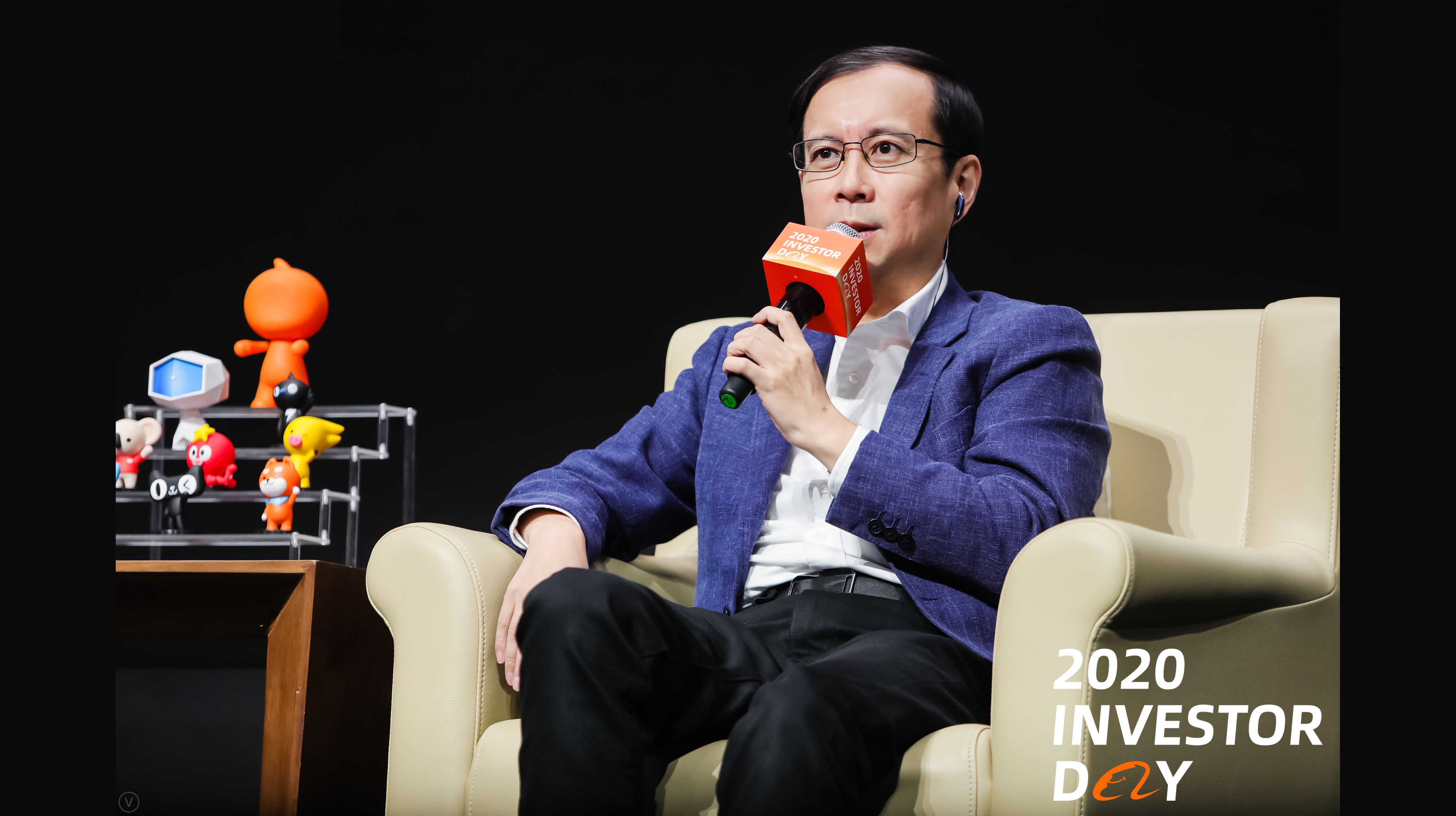
Covid-19 and geopolitics have disrupted normal life and created uncertainties in 2020, but Alibaba Group is well-positioned to help merchants, consumers and economies right themselves and bounce back, Chairman and CEO Daniel Zhang said Wednesday.
Closing out Alibaba’s annual Investor Day event, Zhang told approximately 1,000 viewers tuning in virtually that there had been internal discussion about whether business strategy and priorities needed a revamp to restore normalcy and help economies restart after the pandemic. In the end, the decision to double down on what Alibaba has done best for 21 years was straightforward. The three-day investor event was held largely online this year to follow social-distancing protocols. Zhang spoke from Alibaba’s Hangzhou headquarters.
“In the midst of so many uncertainties, the future of digitalization is the biggest certainty we can see. Digitalization is the biggest opportunity of our time,” Zhang said.
Lessons learned during Covid and in the restart of China’s post-pandemic economy stand Alibaba in good stead to help merchants and economies around the world recover quicker. In addition, Covid sped up the process of digitalization, with individuals and companies suddenly forced to move daily activities online. As the world emerges from Covid, Zhang said he expects some of the new behavior will stick.
“Digitalization is being embraced by consumers, manufacturers, retailers and brands across China’s economy,” Zhang said.
WATCH: Alibaba Chairman & CEO Daniel Zhang at Investor Day 2020
Specifically, pandemic lockdowns in China led to a surge in new consumption categories or ones that had been under-penetrated pre-Covid, including groceries, fresh foods, healthcare and wellness products. Zhang said Alibaba saw a sharp rise in online sales from those categories. The pandemic also changed how people worked and learned, Zhang noted, presenting an opportunity for Alibaba’s Digital Economy to provide critical infrastructure and solutions at a critical time.
The results of digitalization speak for themselves as China continues its shift from an export and investment-driven model to a demand and consumer-driven economy. Tapping into China’s growing consumption power “is the fundamental driver of our future growth,” Zhang said.
It’s also powering present growth, with the gross merchandise volume of Alibaba’s Digital Economy topping $1 trillion in the 12 months ended June 30, 2020 –accounting for 18% of China’s total retail sales, up from 10% in 2015.
The other two growth engines for Alibaba’s future are cloud computing & data intelligence and globalization, Zhang said.
On the Alibaba Cloud front, CFO Maggie Wu had positive news for investors tuning in, telling them she expects the group’s cloud computing and data intelligence unit, which counts over 3 million paying customers and had revenue growth top 60% year on year in the 12 months ended June 30, 2020 to turn profitable at some point during the 2021 fiscal year. Meantime, the group’s logistics unit Cainiao, founded only seven years ago, is expected to generate a positive operating cash flow during the fiscal year, she said.
Wu stressed Alibaba’s growth and success have come from staying true to its mission “to make it easy to do business anywhere,” innovating constantly and investing to create and build out new and necessary infrastructure, platforms, products and services.
“We have always set the first priority as helping merchants and our customers to solve their problems and to operate at higher efficiency through our technology and solutions,” Wu said. “Over the past few years, we have invested over RMB100 billion each year in technology, research and development.”
She said it was key to see the components of Alibaba’s Digital Economy in proper perspective. Businesses Alibaba start up organically fall into the “seed,” “traction” and “profitability” categories. Tmall and Taobao, as the main drivers of Alibaba’s core commerce operations, are older and highly profitable. They generate strong cash flow used to reinvest in businesses that are achieving traction or to incubate new businesses – either organically or via investments in businesses that build out or complement strategic needs of the digital economy.
The group had net cash of $36 billion as of June 30, 2020, along with $45 billion in strategic investments, she said.
Wu gently chided investors about valuations that don’t count new or non-core commerce business operations. For example, the market has assigned very little value to Alibaba Cloud’s business or the group’s stake in Ant Group, which is preparing for a multibillion-dollar initial public offering.
“The point I want to make here is that the market is reflecting only the value of our core core-commerce businesses, and has not yet given any credit to any of our other businesses within the core,” Wu said.
Add even conservative valuations of those and other businesses into the mix, and Alibaba – which already stands out among “peer” technology companies, such as Facebook – stands out even more.
Zhang said over the next three to five years, Alibaba is focused on building out its digital economy, now with 1.07 billion annual active users, moving into new consumption categories, new markets and new industry opportunities. With integrated data intelligence and customer insight, an eagerly anticipated revolution of how supply chains work is at hand. Alibaba’s long-term goal remains to serve 2 billion customers, create 100 million jobs and help 10 million small and medium-sized enterprises be profitable by fiscal year 2036.
Also during Alibaba Investor Day 2020, key business units updated on their latest developments:
China Retail Marketplaces
It has been another year of robust growth for Alibaba’s China Retail Marketplaces –with especially good growth in less-developed areas.
Over the year, the marketplaces added close to 119 million MAUs, while the number of annual active consumers reached 742 million in the last quarter. More 70% of new consumers came from China’s less-developed cities. Taobao, Tmall and Alimama President Jiang Fan pointed to significant potential for user growth in the next two to three years.
Alibaba’s membership programs, including 88VIP and Taobao Pass, are also gaining traction among consumers. These programs had more than 30 million paying users expected as of September and have helped to strengthen customer loyalty and drive higher levels of spending.
“Consumers are increasingly looking for immersive and interactive online experiences,” he added. That’s why the company has continued to optimize Taobao, from its recommendation feed and Taobao Live, to short-form video and interactive game offerings. Sales generated on Taobao Live for the 12 months ended June 30, 2020 have exceeded RMB300 billion, while for the past June 2020 quarter its number of viewers is up 160% year on year. More than 270,000 merchants and 120,000 brick-and-mortar stores have made use of Tmall Flagship 2.0 technologies, as of the end of August.
Jiang said the focus is not just on growing gross merchandise volume, but also bringing value to customers. “We hope our platforms will not only help merchants sell their products, but help them achieve long-term growth,” he said. And for consumers, they aim to create even more innovative, new experiences that make it easy and convenient for them to purchase high-quality goods and services.
B2B
Alibaba’s business-to-business platforms – 1688 and Alibaba.com – have seen the import and export markets growing steadily over the past few years, but many businesses remain “under-digitalized,” with only 15% of wholesale enterprises having gone online.
To make it simple for SMEs to transform digitally, Alibaba’s wholesale platforms are providing an array of upgraded tools and technologies, everything from sourcing and delivery, to serve its users.
1688.com has 920,000 paying members and 41 million active buyers in terms of domestic wholesale in China. Alibaba.com has 190K paying members and 26 million active buyers for international wholesale. The number of U.S. sellers grew by 120% year over year as of June 30, 2020.
Freshippo
Supermarket chain Freshippo, Alibaba’s most successful example of New Retail, reported that its annual active consumers have exceeded 25 million. It’s also expanded its footprint from 159 stores to 227 stores in the past year ending June.
Freshippo is investing heavily to develop its core competencies, from innovative technologies to procurement and merchandising. It now has more than 550 agricultural bases supplying fruit, vegetables, meat and diary, including some exclusively offered at its stores, such as premium beef from New Zealand. About 30% of its products are now procured globally by teams across North America, Europe, Japan and South Korea.
The New Retail-driven supermarket has also strengthened its flagship supply chain and logistic capabilities. Beyond cold-chain warehouses and seafood storage centers, it has built more food-processing centers across the country to turn agricultural produce into marketable, standardized merchandise.
Online sales now represent 65% of Freshippo’s business, compared to 35% coming from its brick-and-mortar stores. And it’s not stopping there. Freshippo said it’s committed to continue innovating new store formats tailored to different consumer needs and income brackets, from its new Freshippo Mini shops designed with tier-three and tier-four city consumers in mind, to its Pick & Go stores, aimed at office workers looking to grab quick breakfast and snacks on their way to daily commutes.
Local Services
Covid-19 has also accelerated the growth of Alibaba’s local services platforms, which now has a user base of over 290 million. The pandemic also led to more merchants embracing digitization, and the platforms added more than 900 national restaurant chains and over 4,000 regional chains – bringing them close to complete coverage of top-tier merchants in the country.
In July, Ele.me announced a major upgrade from delivering just food to just about anything –with enhanced offerings from supermarkets, groceries, flower shops to pharmacies. With new engagement tools like a dedicated short-form video channel, the app is also looking to go beyond an on-demand delivery platform but also a hub for discovering the world of food, said Wang.
In the past year, Ele.me said it has also completed integrating its systems with Alibaba’s technological backbone, including connecting user traffic and migrating its infrastructure onto Alibaba Cloud. Currently, 45% of Ele.me’s new consumers come via the Alipay app, and it expects new consumers to come from other Alibaba apps such as Taobao and Amap. It’s also creating differentiated products through tapping Alibaba’s ecosystem, such as prepaid cards for gyms and beauty and hair salons and Foodie Cards that provide consumers with additional Huabei credit allowances up to RMB1,500, so they can eat first and pay later – popular among young people.
Alibaba Cloud
Alibaba Cloud is a leading cloud services provider. Its business saw undisrupted growth during the pandemic. It has the largest market share in Asia Pacific and China. Alibaba Cloud now has more than 3 million paying customers on its cloud platform worldwide, and as Alibaba CFO Maggie Wu said Wednesday, it is expected to move into profitability during the 2021 fiscal year.
The business has observed two major trends: In terms of value-added services, the share of non-IAAS (Infrastructure as a Service) revenue continues to increase, reaching 55% in the first half of calendar 2020, reflecting a growing demand and positive performance for Alibaba Cloud’s advanced offerings. The business is also serving more high-paying, premium customers, with 60% of companies listed on China’s A-share market using Alibaba Cloud in 2020.
This year, Alibaba Cloud has adjusted its global strategy and shifted its focus to Southeast Asia. Its data center revenue in the region achieved 200% growth while serving well-known customers like Presto Mall.
China’s digital adoption of cloud services has accelerated in the wake of Covid-19, with more businesses demanding agile solutions. In response, Alibaba Cloud will further invest in big data, smart solution and mobile collaboration on top of its cloud computing infrastructures.
Cainiao
Cainiao Network continues to strengthen its platform to support the flow of goods worldwide, including in its logistics hubs, line-haul routes, smart customs clearance platform and fulfillment and supply chain technologies. During the Covid-19 pandemic, the network also played a key role in delivering essential supplies around the world. According to its latest figures ending June, Cainiao has helped ship 130 million pieces of protective equipment to 150 countries and regions.
Cainiao is also rapidly expanding its last-mile network. It now operates more than 80,000 Cainiao Post stations across China and looks to further elevate the consumer experience with new community-focused offerings at these stations, such as laundry services. The use of internet-of-things technologies, such as contactless devices, have also helped shortened package pick-up times by 33%.
“Digital transformation has brought significant changes to the dispatch and receival experience of packages,” said Wan Lin, president of Cainiao Network. He added that, in June, Cainiao Post and Cainiao Guoguo processed 110% more packages than the same period last year.
The platform said it has processed over 40 billion digitized packages in the past year ending June. Revenue from global and domestic fulfillment services also grew by more than 50% year on year in the quarter ending June.
Digital Media & Entertainment
Alibaba’s digital entertainment businesses include Youku, Alibaba Pictures and Damai.
The emergence of 5G technology will encourage an increase level of content consumption among internet users in China and Alibaba Group’s flagship video-streaming platform Youku is diversifying its content to meet this demand. In June of this year, it launched a new version of the Youku app to integrate both long and short-form videos. At the same time, it boosted its long-form content investment to attract paid users. It also tapped into Alibaba’s data analytics to inform its subscriber engagement and product technology.
In terms of offline content consumption, Alibaba Pictures has showed signs of recovery after Chinese cinemas and lives performances reopened in August. It rolled out several blockbusters like Oscar-winning war epic 1917 and summer hit The Eight Hundred to bring Chinese moviegoers back to the cinemas. At the same time, it plans to leverage China’s upcoming long holidays to premier other premium content and major films.
Damai, China’s largest entertainment ticket seller, now holds a 70% market share. In responsive to Covid-19 disruptions, the platform has come up with creative ways to engage with event-goers virtually, such as hosting online concerts. The Believe in the Future campaign turned out to be the largest online charity concert in China to date and attracted 440 million views.
Click here for more highlights from Alibaba Investor Day 2020.





